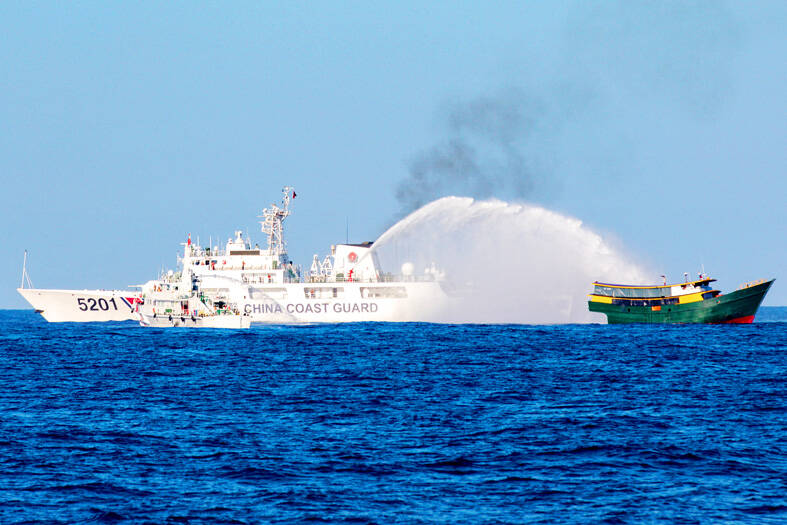Japan could cooperate with Taiwan and other Asian nations on maritime security to counter the threat posed by China, former Japan Coast Guard commandant Takahiro Okushima wrote in a recently published book.
China Coast Guard vessels regularly sail near the Diaoyutai Islands (釣魚台群島), known as the Senkakus in Japan, and Beijing has increased those patrols since the Japanese government purchased the islands from a private owner in 2012, Okushima wrote.
Over the past five years in particular, China has normalized its “harassment” of Japanese authorities near the islands, and conducted 159 patrols in 2018 and 352 last year, he wrote.

Photo: Reuters
The patrols are similar to those experienced by Taiwan, the Philippines and other nations in the region, who regularly encounter Chinese coast guard vessels near their waters, he wrote, adding that the issue could be soled without involving the military by establishing a joint “maritime law-enforcement agency” with the Japan Coast Guard at its center.
Okushima, who was in charge of maritime security near the Diaoyutais in 2012, and was promoted to commandant in 2000, retired in June 2022.
In his book, Okushima outlined four measures Beijing has adopted over the past few years to strengthen China’s coast guard: It increased its number of coast guard vessels, began producing larger vessels and arming them, put the coast guard under the authority of the Chinese Central Military Commission in 2021 and implemented the Coast Guard Law the same year.
“Ten years ago, the Japan Coast Guard had 51 patrol ships of more than 1,000 tonnes, and the China Coast Guard had 40 ships,” he wrote. “At the end of 2022 the Japan Coast Guard had 71 large patrol ships, while China had amassed 157 ships. Also, China’s ships use 76mm guns compared with Japan’s 40mm guns.”
Nevertheless, the Japan Coast Guard is well-trained and can respond to provocations without allowing them to escalate, he wrote, adding that it is trusted by the nation’s neighbors.
As China ramps up its harassment of Philippines vessels in contested waters there are concerns in Japan that it would start harassing Japanese vessels just as often, Okushima said.
The Japan Coast Guard would respond in such a scenario, and would handle the situation in a manner that would avoid an armed conflict, he said.
In its general budget for this year, Japan allocated ¥261.1 billion (US$1.8 billion) for maritime security, an increase of 7 percent from the previous year, and the highest amount ever budgeted for the purpose, Okushima said, adding that this included ¥21.3 billion for patrolling the Diaoyutais.
“Strengthening coast guards, which are non-military law enforcement agencies, is an effective tactic for Asian countries to confront a powerful China,” he said.

Temperatures in northern Taiwan are forecast to reach as high as 30°C today, as an ongoing northeasterly seasonal wind system weakens, the Central Weather Administration (CWA) said. CWA forecaster Tseng Chao-cheng (曾昭誠) said yesterday that with the seasonal wind system weakening, warmer easterly winds would boost the temperature today. Daytime temperatures in northern Taiwan and Yilan County are expected to range from 28°C to 30°C today, up about 3°C from yesterday, Tseng said. According to the CWA, temperature highs in central and southern Taiwan could stay stable. However, the weather is expected to turn cooler starting tonight as the northeasterly wind system strengthens again

The Ministry of Foreign Affairs (MOFA) yesterday expressed “grave concerns” after Singaporean Prime Minister Lawrence Wong (黃循財) reiterated the city-state’s opposition to “Taiwanese independence” during a meeting with Chinese Premier Li Qiang (李強). In Singapore on Saturday, Wong and Li discussed cross-strait developments, the Singaporean Ministry of Foreign Affairs said in a statement. “Prime Minister Wong reiterated that Singapore has a clear and consistent ‘one China’ policy and is opposed to Taiwan independence,” it said. MOFA responded that it is an objective fact and a common understanding shared by many that the Republic of China (ROC) is an independent, sovereign nation, with world-leading

COOLING OFF: Temperatures are expected to fall to lows of about 20°C on Sunday and possibly 18°C to 19°C next week, following a wave of northeasterly winds on Friday The Central Weather Administration (CWA) on Sunday forecast more rain and cooler temperatures for northern Taiwan this week, with the mercury dropping to lows of 18°C, as another wave of northeasterly winds sweeps across the country. The current northeasterly winds would continue to affect Taiwan through today, with precipitation peaking today, bringing increased rainfall to windward areas, CWA forecaster Liu Pei-teng (劉沛滕) said. The weather system would weaken slightly tomorrow before another, stronger wave arrives on Friday, lasting into next week, Liu said. From yesterday to today, northern Taiwan can expect cool, wet weather, with lows of 22°C to 23°C in most areas,

DEFENDING FREEDOM: Taiwanese love peace and helping others, and hope to be a positive force in the world, Vice President Hsiao Bi-khim told ‘Weltspiegel’ Taiwan is making every effort to prevent war in the face of China’s hybrid coercion tactics and military threats, Vice President Hsiao Bi-khim (蕭美琴) said in an interview with German public broadcaster ARD’s program Weltspiegel that aired on Monday. Taiwan is not seeking provocation or intending to disrupt international order, but “must possess the capacity for self-defense,” a news release issued by the Presidential Office yesterday quoted her as saying. Taiwan is closely watching not only the increasing scope and frequency of Chinese military exercises around the nation, but also Beijing’s hybrid and cognitive warfare tactics, including manipulating public opinion, fostering